
Bernard of Clairvaux, O. Cist., venerated as Saint Bernard, was an abbot, mystic, co-founder of the Knights Templar, and a major leader in the reform of the Benedictines through the nascent Cistercian Order.
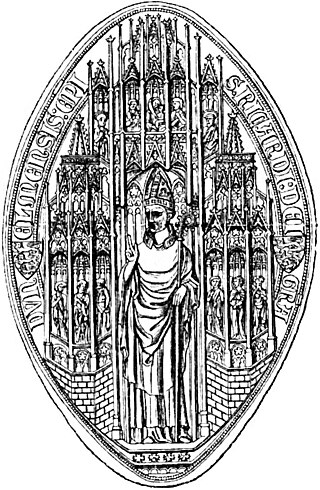
Richard de Bury, also known as Richard Aungerville or Aungervyle, was an English priest, teacher, bishop, writer, and bibliophile. He was a patron of learning and one of the first English collectors of books. He is chiefly remembered for his Philobiblon, written to inculcate in the clergy the pursuit of learning and the love of books. The Philobiblon is considered one of the earliest books to discuss librarianship in-depth.
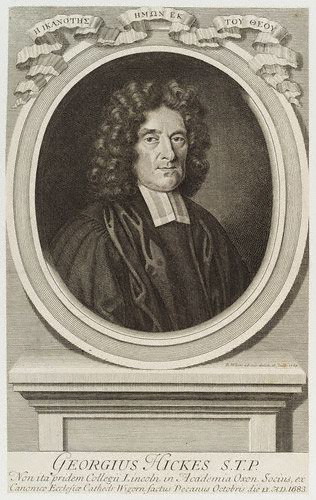
George Hickes was an English divine and scholar.
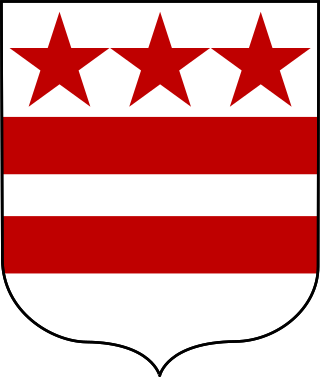
The first coat of arms of a member of the Washington family is first documented in the 14th century, borne by one of the male Washington family members of Washington Old Hall in County Durham, England.

Samuel Ward (1572–1643) was an English academic and a master at the University of Cambridge. He served as one of the delegates from the Church of England to the Synod of Dort.

John Overall (1559–1619) was the 38th bishop of the see of Norwich from 1618 until his death one year later. He had previously served as Bishop of Coventry and Lichfield, as Dean of St Paul's Cathedral from 1601, as Master of Catharine Hall from 1598, and as Regius Professor of Divinity at Cambridge University from 1596. He also served on the Court of High Commission and as a Translator of the King James Version of the Bible.

Durham College was a college of the University of Oxford, founded by the monks of Durham Priory in the late 13th century and endowed by Bishop Thomas Hatfield in 1381.
The Durham Rite is a historical liturgical use of the Roman Rite and the Gallican Rite in the English bishopric of Durham.
Robert of Holy Island was a medieval Bishop of Durham.
Germain Morin (1861–1946) was a Franco-Belgian Benedictine historical scholar, patrologist, and liturgiologist, of the Beuronese Congregation.

John Stanberry was a medieval Bishop of Bangor and Bishop of Hereford. He was the second son of Walter Stanbury of Morwenstow, Cornwall, by his wife Cicely, and the grandson of John Stanbury, esq.

Durham Priory was a Benedictine priory associated with Durham Cathedral, in Durham in the north-east of England. Its head was the Prior of Durham. It was founded in 1083 as a Roman Catholic monastery, but after Dissolution of the Monasteries in 1540 the priory was dissolved and the cathedral was taken over by the Church of England.

The Libellus de exordio atque procursu istius, hoc est Dunhelmensis, ecclesie, in short Libellus de exordio, is a historical work of marked literary character composed and compiled in the early 12th-century and traditionally attributed to Symeon of Durham. It relates the history of bishopric and church of Durham and its predecessors at Lindisfarne and Chester-le-Street (Cunecacestre). It is sometimes also known as the Historia Dunelmensis ecclesiae.
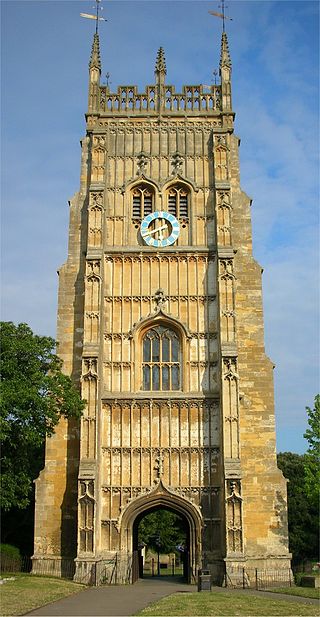
Dominic of Evesham was a medieval prior of Evesham Abbey in England and writer of religious texts. Probably a native Englishman, there is some confusion about when he became a monk, but by 1104 he was at Evesham and by 1125 he held the office of prior. He is chiefly known for his religious works, including one on the miracles of the Virgin Mary that was an important source for later writings on the subject. Four of his works are still extant.
Hugh of Amiens, also known as Hugh de Boves, monk of Cluny, prior of Limoges, prior of Lewes, abbot of Reading and archbishop of Rouen, was a 12th-century Picard-French Benedictine prelate.
Henry Jackson (1586–1662) was an English priest and literary editor.
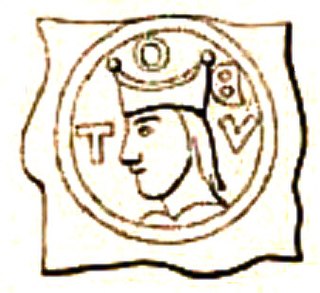
Otto III of Hachberg was Bishop of Constance from 1410 to 1434. During this time he was the host of the Council of Constance (1414–1418). Although he was the second person named Otto in the Hachberg-Sausenberg line of the House of Zähringen, he is consistently called Otto III in the literature, because he was the third bishop of Constance named Otto.
Robert of Bridlington was an English clergyman and theologian who was the fourth prior of Bridlington Priory. He held the office during the period from 1147 to 1156, but it is not clear if he died in office or resigned before his death. Besides holding monastic office, he wrote a number of commentaries on biblical books as well as other treatises. Not all of his works have survived to the current day.
Durham, also known as De situ Dunelmi, Carmen de situ Dunelmi or De situ Dunelmi et de sanctorum reliquiis quae ibidem continentur carmen compositum, is an anonymous late Old English short poem about the English city of Durham and its relics, which might commemorate the translation of Cuthbert's relics to Durham Cathedral in 1104. Known from the late 12th-century manuscript, Cambridge, University Library, Ff. 1. 27, Durham has been described both as "the last extant poem written in traditional alliterative Old English metrical verse" and as being placed "so conveniently on the customary divide between Old and Middle English that the line can be drawn right down the middle of the poem." Scholars have dated the poem either to the twelfth century or to some point in the second half of the eleventh century.
Richard Maidstone or Maydestone was an English Carmelite friar, theologian, and poet.












